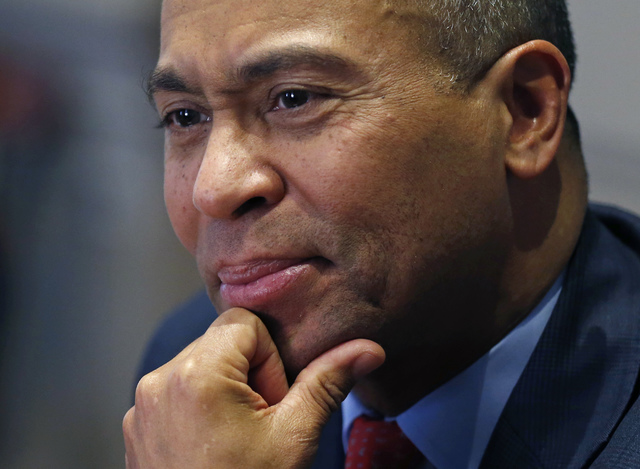WASHINGTON — President Barack Obama’s allies are recruiting high-profile Democrats to help combat liberal resistance to his bid for new trade agreements in Asia and elsewhere. ADVERTISING WASHINGTON — President Barack Obama’s allies are recruiting high-profile Democrats to help combat
WASHINGTON — President Barack Obama’s allies are recruiting high-profile Democrats to help combat liberal resistance to his bid for new trade agreements in Asia and elsewhere.
The effort will sharpen differences between the Democratic Party’s liberal and pro-business wings, especially in New England. And it could accelerate the effort to woo black lawmakers, a key target in the House.
Heading a pro-trade advisory board being announced Tuesday are former Massachusetts Gov. Deval Patrick, former Washington Gov. Christine Gregoire and former US. Trade Representative and Dallas mayor Ron Kirk.
Kirk’s and Gregoire’s roles are not surprising. But Patrick’s might add some sizzle to the trade debate heating up in Congress. Among the Obama trade agenda’s strongest critics is another Massachusetts Democrat, Sen. Elizabeth Warren.
Patrick and Kirk are two of the nation’s most prominent African-American politicians. Obama has openly wooed the Congressional Black Caucus in hopes of securing some of the House Democratic votes he will need to pass his trade plans.
The effort squeezes black lawmakers between a president they generally support and liberal constituents who may strongly oppose new tract pacts.
The politics of trade are unusual. Republicans generally support free trade, as do most presidents, whatever their party.
But liberals, labor unions and some environmental groups have grown increasingly hostile to trade deals in recent years. Meanwhile, numerous congressional Republicans dislike the idea of giving Obama victories on any front.
That’s why the White House is scrambling to gain as many Democratic votes as possible. A recently formed group, Progressive Coalition for American Jobs, on Tuesday said Patrick, Kirk and Gregoire will head its advisory board.
Obama hopes to send two trade measures to Congress this year. The first will seek Trade Promotion Authority, often called TPA or “fast track.” It would renew presidential authority to present trade deals that Congress can endorse or reject, but not amend.
The second measure will be the Trans-Pacific Partnership, or TPP, a proposed trade agreement involving the United States, Japan, Vietnam, Canada, Mexico and seven other Pacific-rim nations.
Labor unions and others say the Pacific pact would hurt U.S. job growth and encourage other countries to abuse workers and the environment. The Obama administration rejects those claims, and says U.S. goods and services must have greater access to foreign buyers.
Patrick said in a statement it’s better to have the Obama administration hammering out trade objectives “through the Trans-Pacific Partnership than leaving it to administrations, at home or abroad, less sensitive to worker rights and environmental stewardship.”
Pro-trade and anti-trade groups are pouring huge resources into the debate. Various coalitions have hired top lobbying and PR firms. They host forums, conduct conference calls or release reports almost daily.
Liberal groups have picketed the home — and threatened a 2016 Democratic primary challenge — of Sen. Ron Wyden of Oregon, the top Democrat on the Senate Finance Committee, which handles trade. Pro-trade groups have advertised in Oregon to defend Wyden, who says he hopes trade legislation will pass.



